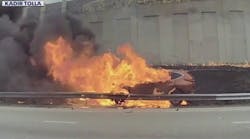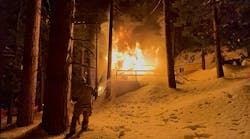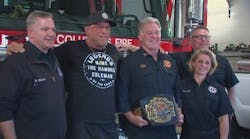June 21--ConAgra Foods Lamb Weston officials say a modern fertilizer plant proposed next to its French fry facility threatens its workers and the American Falls community.
Earlier this month, the Eagle subsidiary of one of the nation's largest food companies appealed the air quality permit for Magnida, a New York company seeking to build the $2 billion plant. Magnida hopes to complete the financial arrangements this fall, with construction to begin in the summer of 2015.
The fertilizer project, versions of which have been in the works for more than a decade, has broad support, including from Gov. Butch Otter. The Idaho Conservation League backed its air permit.
Its investors include a private equity firm led by former executives of Morgan Stanley, but other companies are planning similar plants -- with technology new to the U.S. industry proposed in North Dakota and Indiana.
Magnida's CEO says ConAgra's full-page ad in several Southern Idaho newspapers Sunday bringing up a 2013 explosion at a Texas fertilizer facility that killed 15 people was an effort to delay the project. That plant stored ammonium nitrate; the explosion is still under investigation.
Magnida says it expects to hire 1,900 people during construction and have 170 people working permanently at the natural gas plant. It would turn natural gas into ammonia nitrate fertilizer for domestic farmers, opening as soon as 2018.
Lamb Weston earlier raised concerns about the proposed plant's effects on emergency preparedness, odor and water quality. But ConAgra, its parent company, upped the ante with Sunday's ads.
"The safety of our employees is paramount," Greg Schlafer, president of ConAgra Foods Lamb Weston, said in an interview with the Statesman.
IDAHO, FERTILIZERS
In its ads, ConAgra said that "fertilizer plants carry significant risks to health and safety and Magnida's proposed plant would produce very large amounts of toxic and highly dangerous chemicals."
Magnida CEO Ric Sorbo said ConAgra's ad was not true. Control and monitoring systems are designed into the plant and have backups, he said. Those systems have to be approved by state and federal regulators before operation.
"Modern fertilizer plants are very sophisticated, with multiple levels of safety systems, operated by trained and skilled personnel," Sorbo said. "They have excellent operating records."
ConAgra's assertion that it supports the fertilizer plant, as long as it is relocated, is belied by its remarkable attempts to tie the plant to the Texas explosion, Sorbo said.
Schlafer said he just wants Magnida to build on a different site, but Sorbo said no other site in the area with the right zoning is close to a natural gas pipeline and a railroad line.
"Clearly they're opposed or they wouldn't be running ads like this," Sorbo said.
Idaho's J.R. Simplot Co. operates a phosphorus fertilizer plant 30 miles east of American Falls. It also manufactures ammonia nitrate fertilizer in Helm, Calif.
Ron Funk runs the Simplot retail store in American Falls and serves as chairman of the Power County Commission. He said the first time he heard that ConAgra had any concerns about the project was this spring, just prior to a public hearing on Magnida's air quality permit.
Those concerns were about dust, odor and water, Funk said.
"I don't recall this issue of the plant exploding," he said.
CAUGHT IN THE STORM
Funk, like other state and local leaders, is caught in the middle of the fight between the two companies. He doesn't want to do anything to jeopardize the 600 jobs at Lamb Weston, but he also wants to help Magnida bring higher-paying jobs to Power County.
In 2001, FMC Corp. closed an elemental phosphorus plant in Power County that had been in operation since the 1940s.
"When FMC closed, we went from the county with the highest per capita tax base to the lowest," Funk said.
Outside the farm products store he runs for Simplot sit 300 to 400 tons of nitrogen fertilizer.
"We just unloaded three rail cars with 99,000 pounds apiece," he said.
"I don't know where this safety issue comes from. We need to put something in this community."
ConAgra officials say the issue is a matter of scale. ConAgra Foods Lamb Weston has a total of 86,000 pounds of ammonia in two sealed refrigeration systems. Magnida is proposing to produce 5 million pounds of ammonia per day.
Funk hopes the two companies can resolve their differences. Sorbo offered dates for another meeting next week.
"ConAgra Foods is very interested in discussing our concerns with Mr. Sorbo and coming to an agreement that will benefit all parties," Stoolman said.
But Schlafer was firm in a meeting with Statesman editors Tuesday, saying the plant should move not just to protect his workers, but also the community.
"American Falls High School is just east of the plant site," he said.
Rocky Barker: 377-6484
Copyright 2014 - The Idaho Statesman





